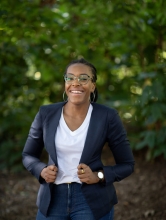Wenimo Okoya, PhD
As a Black woman, an educator, and now a mother, I continue to feel an overwhelming mix of emotions as our communities navigate ongoing violence, injustice, and systemic racism. The pain, rage, and exhaustion I felt in 2020 after the murders of George Floyd, Breonna Taylor, and Ahmaud Arbery have not dissipated. Instead, they have been compounded by the continued attacks on Black lives, the rise of racial violence, and the persistent racial disparities in health, education, and economic stability.
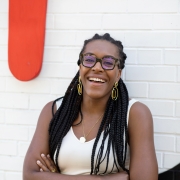
I look at my community and see so much beauty, brilliance, and resilience. I am the aunt of four Black nephews, and now, as a mother, my perspective has deepened in ways I never could have imagined."
When I think about what our children are witnessing and experiencing, my heart aches. Their innocence is being disrupted by a world that refuses to prioritize their safety, dignity, and joy.
The past few years have been filled with ongoing crises—from the continued impact of the pandemic to racialized violence and political attacks on education and racial equity. Black children are growing up in a time when their history is being erased from school curriculums, their right to be safe in their communities is constantly under threat, and their families are facing economic and health disparities that are deeply rooted in systemic oppression.
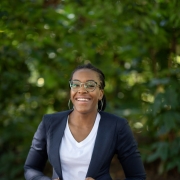
As an educator and someone who works closely with schools and communities, I am deeply concerned about how Black children are processing these experiences."
Many of the children I serve come from historically marginalized communities, where systemic racism has long dictated the quality of education, healthcare, and opportunities available to them. The trauma they endure is not just individual—it is generational, communal, and reinforced by the structures meant to protect them.
Every day, Black children see messages that tell them they are less valued, less protected, and more expendable. Whether it is through the news, social media, or their lived experiences, they are internalizing the reality that the world does not always see their full humanity. This can have devastating effects on their mental health, sense of self-worth, and overall well-being.
But I refuse to let that be the end of the story.
Our children need more than just protection from harm; they need intentional efforts to cultivate their joy, celebrate their brilliance, and affirm their worth. They need spaces where they can heal, where they can express their full humanity, and where they can imagine a future rooted in possibility and freedom.
This is precisely why the Institute for Healing and Belonging in Schools exists.
The Institute for Healing and Belonging in Schools at NYU Metro Center was founded on the belief that schools must be spaces of healing, not harm. We are committed to supporting educators and school leaders in building environments where Black children—and all children—can feel safe, affirmed, and empowered. Through healing-centered research and practice, we work to address the deep-seated traumas caused by systemic inequities while fostering cultures of belonging and joy.
"Our work is not just about responding to trauma; it is about creating conditions for liberation. We partner with schools to reimagine what education can look like when it prioritizes healing, equity, and justice."
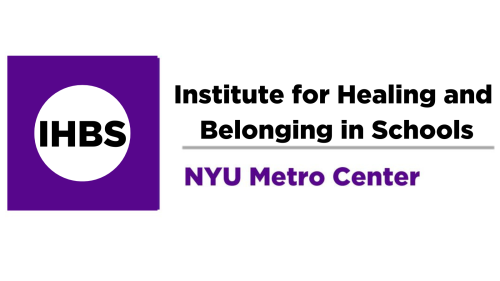
We support teachers in understanding their own trauma and well-being so they can show up fully for their students. We advocate for policies that dismantle punitive and oppressive structures in education and replace them with approaches that affirm students' identities and humanity.
We understand that healing is both personal and collective. That is why we engage in research that uplifts the voices of communities most impacted by systemic harm and translate that research into practice. We provide tools, resources, and professional learning that help schools move beyond performative equity work and into sustained transformation.
Becoming a mother has only strengthened my resolve to center healing in my work. To heal, we must first acknowledge the wounds inflicted by systemic racism, historical trauma, and ongoing violence. We must provide children, families, and communities with the tools and resources to navigate these challenges while centering their joy and power. We must invest in addressing the root causes of inequities—poverty, housing instability, punitive school policies—and create environments where Black children can thrive.
Our work cannot just be reactive. We must commit to the long-term fight for justice, equity, and healing. If we continue to only respond to the symptoms of trauma, we allow the system to continue harming us. Instead, we must invest in liberation. We must work to dismantle oppressive systems while simultaneously building communities that nourish and uplift Black children.

I may not have the power to shield every Black child from harm, but I do have the power to stand in community with others who believe in a future where they are safe, celebrated, and free."
And through the Institute for Healing and Belonging in Schools, I will continue to do so—because our children deserve nothing less.
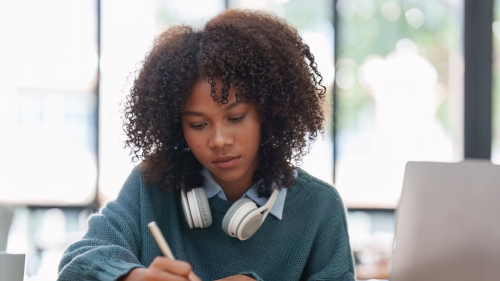
Are you truly interested in building Welcoming, Affirming, and Healing Schools? Do not miss the EQUITY NOW conference on Friday, May 30th, 2025. This critical conference offers a full day of community building, networking and learning for educators, parent/caregivers, youth, community organizers and technical assistance providers who are committing to transforming their classrooms, schools and districts. All will walk away with clear next steps on what transformational education looks like when children, families, educators and community experience welcoming, affirming, healing and liberatory spaces.


